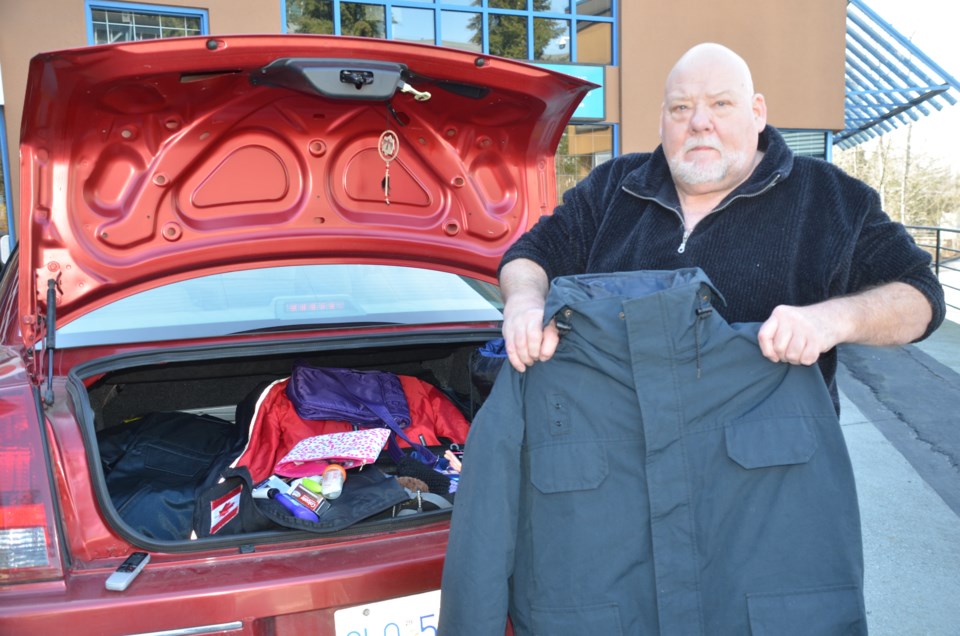Spending time in orphanages as children has given two Lower Mainland men a firsthand appreciation of the security that comes with having a roof over their heads and food in their bellies.
New West resident Henning Nielsen is the founder and CEO of One More Time, and Coquitlam resident Don MacMillan is the non-profit’s president. Since it was formed 15 years ago, One More Time had fed thousands of meals to needy folks in New Westminster, Burnaby, Surrey and the Downtown Eastside of Vancouver.
“One of the reasons this is important for us, both him and I spent time in orphanages when we were younger,” Nielsen said. “We know from the other side that it is not always smooth riding.”
Launched as a one-time event in 2005, One More Time soon started serving meals to 100 to 150 people people every two to three weeks. Nowadays, the leaders and a team of volunteers help feed and support folks in need several times a week at feeding and clothing events in parks, on street corners and in back alleys.
According to Nielsen, One More Time has served more than 125,000 hot meals and has given out more than 25,000 sandwiches and drinks to folks who are living on the streets. In the past couple of years, it has been giving out winter survival kits that include a sleeping bag, winter jacket and a backpack or duffle bag filled with assorted items folks may need.
“Everything that is in the bag, in the winter kit is always brand new – the clothes, the blankets,” Nielsen said. “It’s important that it is brand new stuff.”
Several nights a week, Nielsen hits the road after 11 p.m. to disperse kits to people who don’t have a place to stay for the night.
“Most of the time, the bullies always seem to get a room because they are aggressive enough. But the young, the elderly, the mentally ill, people like that, don’t seem to get a room and they sleep in other places,” he said. “We give them a sleeping bag, a real good jacket and a survival kit. We have all kinds of things that go in it. Some churches will let them stay overnight on their benches because they have clean sleeping bags.”
The survival kits are filled with a variety of items, including food like pepperoni and noodles, toiletries like toothbrushes and toothpaste, a thermos that people can use to make the noodles, socks and toques, a raincoat, cutlery, hand heaters, water and a $5 gift card to Tim Hortons so people can buy something and get hot water for their noodles.
“I just drive around. After 15 years I know where they are located, where they try to get a dry place to stay,” Nielsen said. “If you go out after 11:30 at night and start looking around, you’ll be amazed how many people are on the streets in Burnaby and New West, sadly.”
One More Time raises money for the food programs and emergency kits through fundraisers such as dances, raffles, carwashes, clothing sales, silent auctions and bottle drives.
Nielsen hopes the kits help folks living on the street get through the nights a little better.
“People can’t afford it, so there are more people on the streets,” he said. “It’s not easy surviving in the Downtown Eastside. It’s easier here in New Westminster and Burnaby. Nevertheless, hungry is hungry and cold is cold.”
After 15 years of helping homeless people, Nielsen had hoped the number of people on the street would be decreasing, but it’s not working out that way.
“When we started 15 years ago, I thought I could solve all the problems,” he said. “Now I just know I can only help a little and make it better.”
Homelessness in Metro Vancouver
Metro Vancouver’s 2017 homeless count, conducted over a 24-hour period in March 2017, reported there were 3,605 people who were found to be homeless, which was a 30 per cent increase from the 2014 count. Of the 3,605 people who were identified as homeless, 1,032 had no shelter and 2,573 had shelter at places such as shelters, transition houses and safe houses.
The study found that: 72 per cent of those counted were male, 27 per cent were female and one per cent were of another gender; 16 per cent were youth under 25 and 21 per cent were seniors over 54; 34 per cent of respondents self-identified as indigenous/Aboriginal; 83 per cent reported at least one health condition (addiction – 53 per cent; medical condition – 44 per cent; mental illness – 38 per cent; and physical disability – 33 per cent) and 52 per cent reported two or more health conditions.
The 2018 Youth Homeless Count in Metro Vancouver, conducted in April 2018, found a total of 681 youth and children were experiencing homelessness across the region, with 643 youth aged 13 to 24 living independently of their parents or guardians and 38 under the age of 25 living with their parents or guardians. Thirty-five per cent of the 681 youth were sheltered in a shelter, safe or transition house or detox facility or recovery house, while 64 per cent had stayed outside in a vehicle, in a makeshift shelter or tent, in an abandoned/vacant building or were couch surfing and staying in temporary indoor accommodations.
The 2017 homeless count can be found at www.tinyurl.com/2017-Metro-Vancouver-homeless, while the 2018 youth homeless count can be found at www.tinyurl.com/Metro-Van-youth-homeless.



